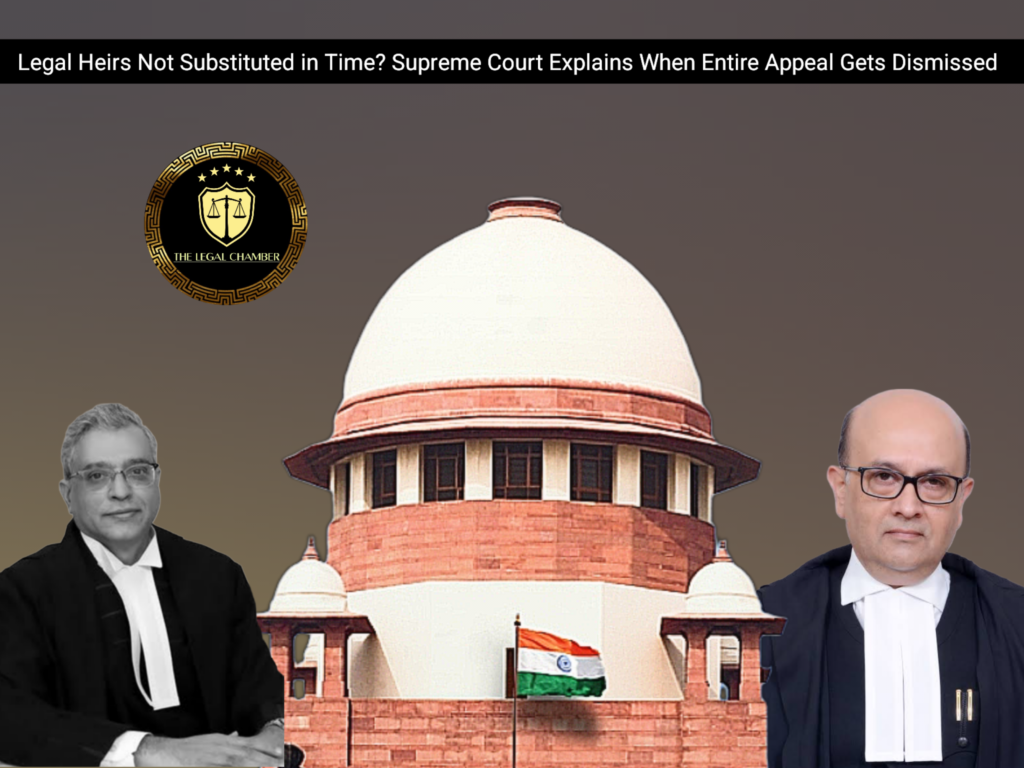Procedural History:
The procedural history of the case begins with the filing of Civil Suit No. 13 of 1983 (later renumbered as 16A of 1997) by Parasram (respondent) against Suresh Chandra and Ram Babu (appellants) in the trial court, seeking declaration of title, possession, and mesne profits over a disputed property. The trial court dismissed the suit, prompting Parasram to file a first appeal, which was allowed by the appellate court, decreeing the suit in his favor. The appellants then filed a second appeal before the High Court of Madhya Pradesh at Gwalior. During the pendency of this appeal, Ram Babu (appellant no. 2) died in 2015, but his legal representatives were not substituted within the prescribed time. Consequently, the High Court declared the appeal abated in 2022 and subsequently rejected applications for condonation of delay and substitution. Aggrieved by these orders, the surviving appellants (legal heirs of Suresh Chandra) approached the Supreme Court via special leave petitions. The Supreme Court upheld the High Court’s decision, ruling that the appeal had abated entirely due to the joint and indivisible nature of the decree, and non-substitution would result in contradictory decrees. The Court also clarified that Order XLI Rule 4 of the CPC could not salvage the appeal since it was jointly filed by all appellants.
READ ALSO:No Arbitration Without Clear Agreement: When Does a Dispute Clause Become Binding? Supreme Court’s Latest Verdict Explained
Court Observation:
The Supreme Court made several key observations while dismissing the appeal. It first affirmed the High Court’s finding that no sufficient cause existed to condone the delay in filing substitution applications, noting the appellants’ unexplained inaction despite knowledge of Ram Babu’s death in 2015. The Court emphasized that when a decree is joint and indivisible, as in this case where both appellants claimed common title through their father, abatement due to non-substitution of one appellant’s legal representatives necessarily results in the abatement of the entire appeal. It rejected the argument based on Order XLI Rule 4 CPC, clarifying that this provision applies only when an appeal is filed by some (not all) co-defendants, which wasn’t the situation here. The Court highlighted that allowing the appeal to proceed would create an impermissible situation of conflicting decrees – one final decree against the deceased appellant (holding him to be a tenant) and another potentially in favor of the surviving appellant (declaring ownership). This, the Court held, would violate the fundamental principle against contradictory decrees in the same matter. The judgment reinforced that technical procedural lapses in substitution applications cannot be overlooked when they would lead to substantive inconsistencies in adjudication.
Final Decision & Judgement:
The Supreme Court dismissed the appeal and upheld the High Court’s decision declaring the second appeal as having abated in its entirety. The Court ruled that the failure to substitute the legal representatives of the deceased appellant (Ram Babu) within the prescribed time rendered the appeal incapable of being proceeded with, as the decree under challenge was joint and indivisible between the two appellants who had claimed a common defense. The Court rejected the appellants’ reliance on Order XLI Rule 4 of CPC, holding that this provision was inapplicable since the appeal had been jointly filed by all defendants rather than by some of them. The judgment emphasized that allowing the appeal to continue would result in contradictory decrees – one final decree against the deceased appellant affirming the plaintiff’s ownership and another potentially recognizing the surviving appellant’s title – which the legal system cannot countenance. Consequently, the Supreme Court affirmed the abatement of the entire second appeal, leaving the first appellate court’s decree undisturbed, with parties to bear their own costs. The judgment reinforces the principle that procedural compliance in substitution matters becomes substantive when it prevents inconsistent outcomes in adjudication.
Case Details:
Case Title:Suresh Chandra (Deceased) Thr. LRs & Ors. v. Parasram & Ors.
Citation: 2025 INSC 873
Appeal No.: (Arising out of SLP (C) Nos. 15900-15902/2022)
Date of Judgment: July 18, 2025
Bench: Justice Manoj Misra & Justice Pamidighantam Sri Narasimha
